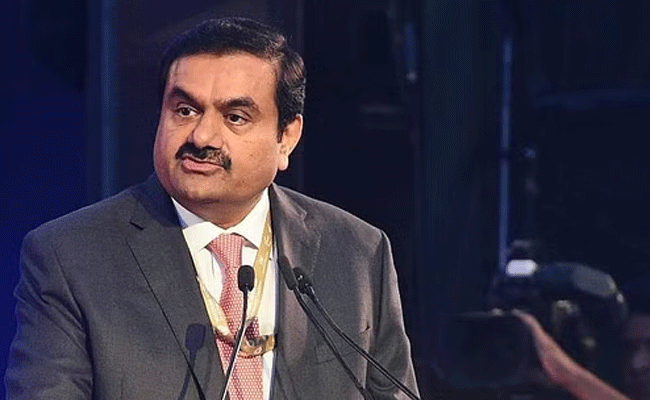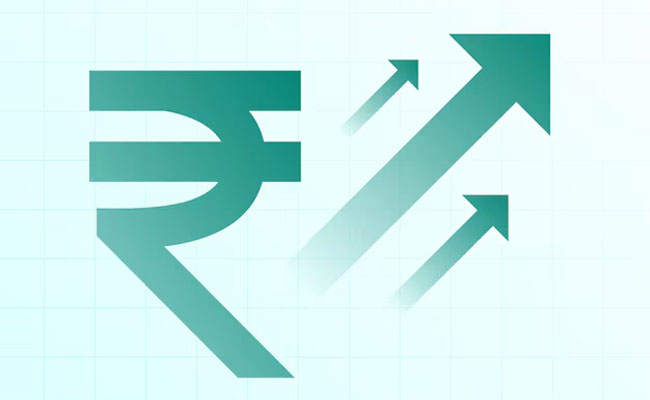New Delhi (PTI): Adani Group will invest more than USD 100 billion (around Rs 8.34 lakh crore) in energy transition projects and manufacturing capability to produce every major component required for green energy generation, its chairman said on Wednesday.
Besides building solar parks to produce electricity from sunlight and wind farms that do the same from wind, the conglomerate is building major facilities to manufacture electrolyzers for making green hydrogen, wind power turbines and solar panels.
Green hydrogen, which is made by splitting hydrogen from water with the help of electrolyzers powered by clean energy, is seen as a potential panacea for decarbonizing the industry as well as transportation.
Speaking at 'Infrastructure - the Catalyst for India's Future' event of Crisil, Adani Group chairman Gautam Adani said energy transition and digital infrastructure are trillion-dollar opportunities which will transform India both at a local and at a global scale.
"The next decade will see us invest more than USD 100 billion in the energy transition space and further expand our integrated renewable energy value chain that today already spans the manufacturing of every major component required for green energy generation," he said.
The coal-to-ports group wants to produce the "world's least expensive green electron" that will become the feedstock for several sectors that must meet the sustainability mandate.
"And to make this happen, we are already building the world's largest single-site renewable energy park in Khavda, in the district of Kutch (in Gujarat). Just this single location will generate 30 GW of power, thereby taking our total renewable energy capacity to 50 GW by 2030," he said.
Adani said the energy transition space will fundamentally change the global energy landscape forever. "The global transition market was valued at approximately USD 3 trillion in 2023 and is expected to grow to nearly USD 6 trillion by 2030, and thereafter double every 10 years till 2050."
"As many of you know, in the case of India, our country aims to install 500 gigawatts of renewable energy capacity by 2030. This ambitious target will require annual investments of over USD 150 billion dollars. The transition to green energy in India is expected to generate millions of new jobs in sectors such as solar and wind, energy storage, hydrogen and its derivatives, EV charging stations, as well as grid infrastructure development," he said.
On digital infrastructure, he said data is indeed the new oil and at the heart of all the action is the Data Centre - the critical infrastructure needed to power all forms of computational needs, especially AI workloads for machine learning algorithms, natural language processing, computer vision, and deep learning.
All of this is dependent on the ability to process data at an unprecedented speed and scale which are the precise capabilities that data centres provide. However, this will need massive amounts of energy, making the data centre business the largest energy consuming industry in the world, he said.
"This makes the energy transition even more complex and is raising electricity prices, thereby adding to the already high prices because of the combined impact of climate change and demand growth," Adani said.
The billionaire said the infrastructure required for energy transition and the infrastructure required for digital transformation are now inseparable as the technology sector becomes the largest consumer of the precious green electrons.
Adani group's digital footprint will span industrial clouds across each of its businesses that it will productize and then take to market, operational technology cybersecurity offerings, super apps to leverage its B2C businesses across wide variety of consumer facing businesses, Artificial Intelligence labs to capitalize on India's fast emerging expertise to provide AI services to the world, and Data Centres that will form the backbone of the energy intensive digital revolution.
"In fact, it is anticipated that by the year 2030, the world will need 100 to 150 GW of additional green energy just for the AI data centres. We already have India's largest order book for data centres and are now in discussions for additional gigawatt-scale green AI data centres which we are uniquely positioned to deliver," he said.
VIDEO | Adani group will invest more than USD 100 billion (around Rs 8,340 crore) in energy transition projects and manufacturing capability to produce every major component required for green energy generation, its chairman said on Wednesday.
— Press Trust of India (@PTI_News) June 19, 2024
Speaking at 'Infrastructure - the… pic.twitter.com/5UPEMm04wS
Let the Truth be known. If you read VB and like VB, please be a VB Supporter and Help us deliver the Truth to one and all.
Girona (Spain) (AP): Lamine Yamal missed a penalty as Barcelona lost at Girona 2-1 on Monday and passed up a chance to overtake Real Madrid at the top of La Liga.
The defeat was the second in less than a week for Barca and left it second in the table, two points behind Madrid.
A win would have taken it above its archrival but, instead, a crisis brewed for coach Hansi Flick, whose side lost to Atletico Madrid 4-0 in the Copa del Rey last week.
The second loss came even though Barcelona took the lead early in the second half.
Yamal hit the post with his spot kick on the stroke of halftime but 14 minutes into the second period Pau Cubarsí met Jules Kounde's cross from the right and placed his header perfectly into the top corner.
The goal was Barcelona's 100th in all competitions this season and made it the second club in Europe's big five domestic leagues to hit the century after Bayern Munich.
However, Girona roared back into the game just three minutes later.
Barcelona's Joan Garcia was already the busier of the two goalkeepers but he could not stop Thomas Lemar side-footing home from close range after nice work from Vladyslav Vanat on the left wing.
Both sides pushed for a decisive second and it was Girona who executed with three minutes remaining, substitute Fran Beltrán scoring with a low shot from just inside the box.
Girona's Joel Roca was sent off in the dying seconds but there were no more goals.
The victory ended a three-game winless streak for Girona and lifted it three places into 12th, equal on points with Getafe.
Only seven points separate the 11 clubs from eighth to 18th in La Liga.





